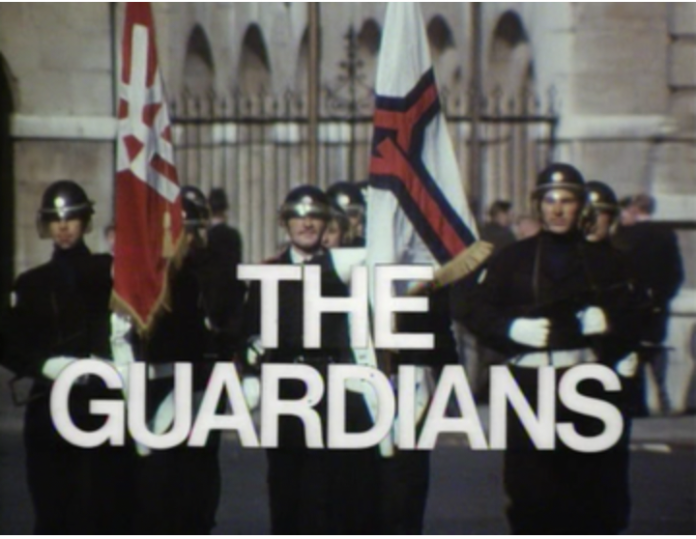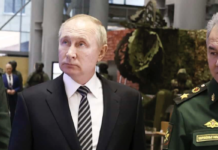A GOOD TELEVISION SERIES can alter the way people view the world. Fifty years from now, people will still be drawing lessons from Game of Thrones. Similarly inspired, I continue to draw lessons from a British television series first screened in 1971, The Guardians.
The “Guardians of the Realm” were the paramilitary force set up to enforce the will an authoritarian British government. Confronted with a rapidly disintegrating United Kingdom, shadowy forces, headed by “The General”, had seized power and established a dictatorial regime. The resistance movement, known simply as Quarmby, responded with a campaign of assassination and terror. Like Game of Thrones, The Guardians is not light viewing.
One episode of The Guardians, in particular, left me forever alert to the cynical use of religion as a political weapon. Not entirely happy with the way things are going in the Guardians’ new UK, the CIA sets up a weird religious movement through which it plans to influence public opinion.
Given what has happened in the years since The Guardians first screened, I have often wondered who the creators of the series, Rex Firkin and Vincent Tilsley, had been talking to. Certainly, radical religious movements were frequently to be found buttressing the authoritarian regimes installed by the CIA throughout the 1970s and 80s – especially those whose primary function had been to forestall, or destroy, left-wing governments attracting dangerous levels of popular support.
This was especially the case in Latin America where the Christian socialism of “Liberation Theology”, espoused by a growing number of Catholic priests and prelates, was attracting a growing following among the rural and urban poor. The ascension of the vehemently anti-communist Polish cardinal, Carol Wojtyla, as Pope John-Paul II, in 1979, served – for a while – to stem the spread of Liberation Theology across the Catholic lands. For those responsible for preserving the global hegemony of the United States, however, Catholic Christianity would always be unsound. Popes come and go, but Christ’s “preferential option for the poor” endures as an unacceptable challenge to the American imperium.
The religious expression weaponised by the CIA was evangelical Protestantism. Both at home and abroad, evangelicalism became an extraordinarily potent rejoinder to the latent socialism embedded in the Christian gospel. Where the Catholic Church preached a theology of atonement and imitation, radical Protestantism promised rebirth and redemption without the need for good works.
“Born again”, the evangelicals could come before God pre-forgiven and debt-free. In combination with the emotional intensity of its services, evangelicalism’s guarantee of salvation constituted a compelling sales pitch. Catholicism’s insistence on confession and penance put them at a competitive disadvantage.
Only three things could keep an evangelical from God’s eternal company: socialism, abortion, and homosexuality. Providing the believer eschewed these three affronts to the Almighty, his or her salvation was assured.
What’s more, evangelical congregations numbering in the thousands were able to give worshippers extremely powerful emotional experiences. They were also large enough to fund comprehensive welfare services to members in need. Who needed socialism when you had your church?
Besides, Jesus wasn’t so much a friend of the poor, as the benefactor of the provident. Nor was he the enemy of the rich. Evangelicals were encouraged to see the accumulation of great personal wealth as a sign of God’s approbation. After all, what sort of incentive to Godliness is poverty?
Having just logged-on to the Brazilian Electoral Commission’s website, the practical effect of this slow but steady spread of evangelicalism across Latin America is staring me in the face. With 99.9 percent of the votes counted, the Socialist candidate, Lula, has fallen agonisingly short of the 50 percent + 1 of the popular vote he needed to avoid a second round against the far-right (and recently baptised evangelical Christian) Jair Bolsonaro.
Had the religious demographics of the states of Rio de Janeiro and Sao Paulo remained what they had been when Lula first won the Brazilian presidency back in 2003, it is likely they would have delivered him the votes he needed to win. With the help of the much increased and increasingly pivotal evangelical vote, however, both states fell to Bolsonaro by wide margins.
One does not need to be a conspiracy theorist to see in the bloody alliance of Latin American dictators, reactionary Catholics and fanatically anti-communist evangelical protestants a political combination of enormous utility to the United States. As New Zealanders, inhabitants of one of the most secular societies on earth, we find it difficult to grasp the centrality of religious belief to the politics of Latin America. Nevertheless, we need to understand that the tactics of the CIA-backed anti-insurgents of the 1970s and 80s were born out of what lay about them. If hands needed to be bloodied, it helped to have a religious faith ready and willing to wash them clean.
Did the creators of The Guardians intuitively grasp the political utility of religious extremism, or did somebody they met in a bar tell them? The early 1970s were a dangerous and dubious time. Shadowy figures gathered in great houses and plotted coups. Assassination and terrorism filled the headlines. Certainly, it was no accident that the network broadcasting The Guardians, ITV, decided that it was all just a little too close to home to be screened in Northern Ireland.
Or, in today’s Brazil.





There’s no reason to believe that the elections in Brazil were in any way legitimate, given the sharp spike in Bolsonaro support vs every poll. I’m not aware of any independent observers from free countries having been present.
Okay, Mark-hammed. Does the PRC pay you, BTW?
@MK agreed, there are multiple factors here not least the influence of the army, the judiciary and political corruption that put Lula in prison with a conviction, since annulled, that prevented him from running in the last presidential election.
From Glenn Greenwald
https://greenwald.substack.com/p/brazils-high-court-invalidates-lulas
And some of what Greenwald has had to endure for ‘committing’ real journalism
https://jacobin.com/2021/04/glenn-greenwald-securing-democracy-review-death-threats-journalism-leaks-lula/
but try to get our media to condemn this…too busy slagging putins referenda
the yardstick seems to be
acceptable to me…fair and democratic
unacceptable to me ‘bogus referendum’
Electoral fraud is very minor to nonexistent these days. hords of Brown shirts roaming polling booths just aren’t a thing anymore. Maybe electoral fraud went underground with the rest of joirnalisms integrity.
sam, wait until the ‘patriots’ performance in the next US elections…not many brown shirts but plenty of flak jackets and red caps on slow thinking fat funda–mentalists
Point taken. We’re all screwed. The U.S civil war 2.0 may very well be upon us.
Can’t bare to think how internal U.S. disruptions will effect the war in Ukraine.
Intelligent people just need to start poping more babies out.
Surely we can send someone there from some lefty institution or so and complain about these election being sham elections. Strongly complain about the out come of these sham elections and sanction the country err the people of the country that did not vote as Capital Inc needed/wanted them to vote.
Jacindas crew are preaching their own woke/treaty religion and all sinners are to be cast out!
I would have thought that the dark ages were enough evidence that religion should not control the state?
As you say the issue is ongoing & prophecy tells us that false religion (Babylon) & government will combine to enforce false worship as this world gets progressively worse.
“…prophecy tells us… ”
(facepalm)
I think the most dangerous religion at the moment is one that has infested New Zealand: The Green one.
What does that even mean?
No doubt about that Andrew.
Maybe you could help then Bob? Are we talking Aliens? In reality what green religion is there?
Warning people about imminent ecological catastrophe and doing something about it is plainly the Devil’s work?? WTAF?
Religion or cult..??
Yes Rob’s Mob a cult is also an accurate description.
“The early 1970s were a dangerous and dubious time. Shadowy figures gathered in great houses and plotted coups. Assassination and terrorism filled the headlines.” Dear me. Were they ‘conspiring’ by any chance?
Well, history is all about plots, intrigues, conspiracies but somehow there are those plots which are fair game to thrash out and those which are forbidden. One can be suspicious but only up to a point and nowadays not openly otherwise one might end up being branded an evil ‘conspiracy theorist.’
The subject of religion is huge and can’t be crudely dismissed. Religion rarely escapes being a political tool. While I am a member of no congregation I recognize the power and importance of faith and its frail sister hope for millions of people world wide.
One may shout out ‘Religion is the opiate of the people’ but the Living Wage Movement had its origins in the Chapel (early evangelical) movement and socialism itself grew out of the Christian tradition.
Nowadays it seems as if there is a vast and impenetrable wall of Feltex between the present time and the seventies when there was still interest in a range of ideas and teachings sought after and discussed; Count Keyserling, Rudolph Steiner, Carl Jung, Krishnamurti, Gurdjieff, Ouspensky,
Joseph Campbell and many others throughout last century.
Now the return to ‘old style religion’ and the emotional hysteria of evangelism is the domain of the reactionary right while the wild maenads of wokeism would tear men apart if they could get away with it.
Who are we? Where did we come from? Where are we going?
on a side bar it always amuses me that rightards love ‘jerusalem'(great stuff makes you wanna go out and burn down the town hall) lyrics by a christian socialist..the jerusalem referred to ‘the shining city on the hill’ was an embodiment of the socialist ideal…which many saw in the start of the welfare state in the UK sometimes actually referred to as ‘the new jerusalem
so fat twerps in union flag y-fronts singing it out of tune is kinda amusing
..nearly as funny as a us choir singing ‘tannenbaum’ ie the red flag.
Maybe if there is to be a meaningful survival of the human race, politics as we know it will be consigned to the dustbin of history along with belief systems.
Sometimes one comes across rather surprising statements made by even more surprising people:
https://www.youtube.com/watch?v=PGt4Dap303Q
Comments are closed.